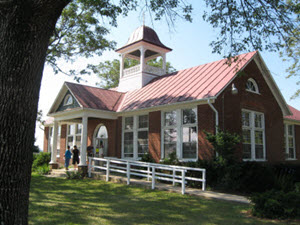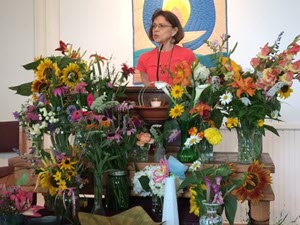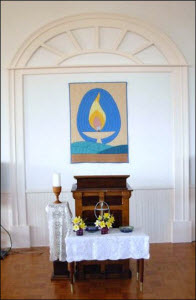
HUU Sermon Archives
Web of Life and the World Wide Web
by Deb Stevens Fitzgerald
April 14, 2002
Teachers have to define terms, so here's an easy visual way to get a handle on what we're talking about. (Overhead of internet)
What IS the difference between the Internet and the WWW? The Internet is the name for the system of computers that are connected through the international telecommunications system. The World Wide Web, or "web," is a way to use the Internet. The Internet can exist without the Web, but the Web cannot exist without the Internet.. (FTP, Gopher, etc.., are other ways to use the Net)
More overheads....examples of websites......
And the World Wide Web is Tim Berners-Lee's alone. He designed it. He loosed it on the world. And he more than anyone else has fought to keep it open, nonproprietary and free. And he's a Unitarian Universalist.
BORN June 8, 1955, in London, and raised there in the 1960s, Berners-Lee is a child of the computer age. His parents met while working on the Ferranti Mark I, the first computer sold commercially. They taught him to think unconventionally; he'd play games over the breakfast table with imaginary numbers (what's the square root of minus 4?). He made pretend computers out of cardboard boxes and five-hole paper tape and fell in love with electronics. Later, at Oxford, he built his own working electronic computer out of spare parts and a TV set. He also studied physics, which he thought would be a lovely compromise between math and electronics. "Physics was fun," he recalls. "And in fact a good preparation for creating a global system
The story of the WWW begins the Swiss Alps. The year was 1980. Berners-Lee, during a six-month stint as a software engineer at CERN, the European Laboratory for Particle Physics, in Geneva, was playing around with a way to organize his very disorganized notes. He had always been interested in programs that dealt with information in a "brain like way". So he put together a piece of software that could, as he put it, keep "track of all the random associations one comes across in real life and brains are supposed to be so good at remembering but sometimes mine wouldn't." He called it Enquire, short for Enquire Within Upon Everything, a Victorian-era encyclopedia he remembered from childhood.
Building on ideas that were popular at the time, Berners-Lee fashioned a kind of "hypertext" notebook. Words in a document could be "linked" to other files on Berners-Lee's computer; he could follow a link by typing in a number (there was no mouse to click back then) and automatically pull up its related document.
He wrote a computer language—HTML (Hypertext Markup Language)—that has come to be the lingua franca of the Web; it's the way Web-content creators put those little colored, underlined links in their text, add images and so on.
He designed an addressing scheme that gave each Web page a unique location, or URL (universal resource locator).
And he put together a set of rules that permitted these documents to be linked together on computers across the Internet. He called them HTTP (HyperText Transfer Protocol).
And on the seventh day, Berners-Lee cobbled together the World Wide Web's first (but not the last) browser, which allowed users anywhere to view his creation on their computer screen.
Through 1991 and 1993, Tim continued working on the design of the Web, coordinating feedback from users across the Internet.
GOOGLE 8/6/91 message to USENET
This is called OPEN SOURCE design... where programmers can read, redistribute, and modify the source code for a piece of software, so the software evolves. People improve it, people adapt it, people fix bugs. And this can happen at a speed that, if one is used to the slow pace of business for-profit software development, is astonishing. And so his initial specifications of URIs, HTTP and HTML were refined and discussed in larger circles as the Web technology spread.
In 1991 the World Wide Web debuted, instantly bringing order and clarity to the chaos that was cyberspace. Within five years (to 1996), the number of Internet users jumped from 600,000 to 40 million. At one point, it was doubling every 53 days.
It's hard to overstate the impact of the global system he created. It's Gutenbergian. He took a powerful communications system that only the elite could use and turned it into a mass medium. If this were a traditional science, he would win a Nobel Prize.
You'd think he would have at least got rich; he had plenty of opportunities. But at every juncture, Berners-Lee chose the nonprofit road, both for himself and his creation.
Marc Andreessen, who helped write the first popular Web browser went on to co-found Netscape and become one of the Web's first millionaires. Berners-Lee, by contrast, headed off in 1994 to an administrative and academic life at the Massachusetts Institute of Technology. From a sparse office at M.I.T., he directs the W3 Consortium, the standard-setting body that helps Netscape, Microsoft and anyone else agree on openly published protocols rather than hold one another back with proprietary technology. The rest of the world may be trying to cash in on the Web's phenomenal growth, but not Tim.
Now Tim had a religious upbringing which he rejected as a teenager, the traditional protestant Christian (Church of England) upbringing.
When he arrived in Massachusetts in 1994 to work at MIT , he found a UU church in his neighborhood, he says, it was "like a breath of fresh air, like coming home - somewhere to talk about spiritual matters and ethical matters and things that count, a place to think and talk and listen without being required to swallow some dogma."
Tim has explicitly drawn some comparisons between the WWW and Uuism, and here's what he thinks:
Decentralizaion
Tolerance
Independent Intervention
Truth and
Hope
Decentralization
The Internet community always used to be decentralized as the Internet itself. Newsgroups have no central server, and no central authority to determine what is and what isn't a new group. When I was developing the Web in 1990, the Internet development community was largely academic in membership and had a very academic style. People were and are judged on what they say rather than who they are. There is very little structure. There is the idea that society can run without a hierarchical bureaucratic government being involved at every step, if only we can hit on the right set of rules for peer-peer interaction. So where design of the Internet and the Web is a search for set of rules which will allow computers to work together in harmony, so our UU spiritual and social quest is for a set of rules which allow people to work work together in harmony.
Tolerance
In this decentralized world, the first common principle is of tolerance.
Unitarian Universalism is famous for its tolerance. UU people don't generally go around trying to convert other people. They respect those who believe in some sort of a God different from theirs (if they even use the term at all).
UUs perhaps share the view that "If there is one thing I can't stand - it's intolerance!". They fight racism and inequality. They get really upset when people are killed and tortured because they don't believe in the One True God or the One True Anything.
The Test of Independent Invention
There's a test I use for technology I call the Independent Invention test.
Just suppose that someone had invented exactly the same WWW system somewhere else, but made all the arbitrary decisions differently. Suppose after many years of development and adoption, the two systems came together. Would they work together? What would happen?
- A huge battle, involving the abandonment of projects, conversion of or loss of data?
- Division of the world by a border commission into two separate communities?
- Smooth integration with only incremental effort?
Obviously we are looking for the latter option. Fortunately, we could immediately extend URIs. We could make gateways, and on the better browsers immediately configure them to go through a gateway when finding a URI of the new type. The URI space is universal: it covers all addresses of all accessible objects. But it does not have to be unique— just universal. So passes the test.
Imagine a Virtue and Veracity church growing up independently, with the same UU principles but none of the same history of vocabulary. What would happen when one of the VV members strolled by accident into a UU church?
Tim says ".An enlightened smile of recognition, the same warm feeling which someone who has really unknowingly been a UU all their life feels when walking into a congregation of UUs.
It's not the same when the followers of divine prophet1 meet the followers of divine prophet2. Divine prophets (often!) know who they are and know they are the only ones. One True Churches that worships the One True God in many cases convince others of their Oneness and Trueness with swords and fire and destruction. The philosophies fail the test of Independent Invention. But the result of this interoperability failure is not an error code or an unreadable Web page but hatred and jealousy, war and persecution.
Tim says though much of the philosophy of life associated with many religions is much more sound than the dogma which comes along with it, noting that UUism has looks for its philosophy to contributions and writings from many religions, western and eastern.
Truth
A lot of people ask me whether I am disappointed that the Web has taken on such a lot of commercial material, rather than being a pure academic space. In fact, I know it could not be universal if it did not allow any form of communication. It must be able to represent any thought, any datum, any idea, that one might have. So in this way the Web and the UU concept of faith are similar in that both serve as a place for thought, and the importance of the quest for truth, but without labeling any one true solution. The quest for the truth is always accompanied by skepticism of anyone claiming to have found it.
Hope
The whole spread of the Web happened not because of a decision and a mandate from any authority, but because a whole bunch of people across the 'Net picked it up and brought up Web clients and servers, it actually happened. The actual explosion of creativity, and the coming into being of the web was the result of thousands of individuals playing a small part. In the first couple of years, often this was not for a direct gain, but because they had an inkling that it was the right way to go, and a gleam of an exciting future. It is necessary to UU philosophy that such things can happen, that we will get to a better state in the end by each playing our small part. UUism is full of hope, and the fact that the Web happens is an example of a dream coming true and an encouragement to all who hope.
OK, now what does all this mean? Here's what I think.
The less informed people are, the easier it is to con them, the easier it is to persuade them of one thing or another because they don't have access to any source of material that would allow them to deny what you are telling them. And changing knowledge means changing values. The web changes what we know. Once it was good to burn women, now it's not.
When what we "know" changes, the way we view the world changes.
Nonconformity with the current "view" of the world has historically meant punishment.
Disagree with the church? You'd be punished as a heretic.
With the political system? You'd be punished as a revolutionary.
With the scientific establishment? As a charlatan.
With the educational system? As a failure.
But many societies have been based on the idea that there was no way that everyone's voice could be heard. There's now the possibility that we can grow towards a society planet-wide that's a kind of balanced anarchy in which no single privileged way of doing things exist, that's tolerant of every view, of disagreement. I hope that the Internet and the Web have let too many cats out of too many bags to close all the bags now. That this technology, which affects what we know and thus how we see the world, will teach us that there are as many views of values, ethics, standards, and truth as there are people on the planet.
Read more sermons or talks by Deb Stevens Fitzgerald.
For the latest sermons and events at HUU, visit our Community Cafe.
Inclement
Weather Policy
Worship
Service Materials


UUs on YouTube
Our denomination has an official presence on YouTube! The Unitarian Universalist Association's YouTube site includes several videos and lots of interesting commentary.
Harrisonburg Unitarian Universalists 4101 Rawley Pike | Harrisonburg,
VA 22801
Mailing Address: | PO Box 96 | Harrisonburg, VA 22803
| (540) 867-0073 | Webmaster
HUU is a member of the Southern
Region of the Unitarian Universalist
Association
Privacy Policy &
Disclaimer
Site Design & Maintainence : Expression
Web Tutorials & Templates


